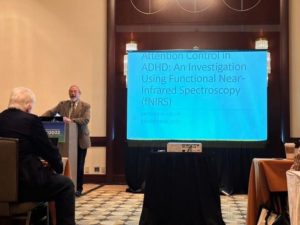Excellence in Emerging ADHD Researchers
Rachel James, MSLIS
Attention Magazine December 2022
Download PDF
Rachel James, MSLIS

Representing CHADD's professional advisory board, Max Wiznitzer, MD, introduced the winners of the Young Scientist Research Awards during the 2022 Annual International Conference on ADHD in Dallas, Texas.
A point of pride for CHADD is the ability to offer opportunities for emerging researchers to showcase their innovative work studying ADHD. For one of its signature programs in this area, the Young Scientist Research Awards, CHADD typically receives incredibly strong applications from pre- and post-doctoral researchers, and 2022 was no different. Selected from this competitive pool of talent, CHADD is honored to announce the recipients of the 2022 awards: Courtney Zulauf-McCurdy, PhD, and Catrina Calub, PhD.

Max Wiznitzer, MD, and Steven Pliszka, MD, presented the 2022 Young Scientist Research Awards to Catrina Calub, PhD, and Courtney Zulauf-McCurdy, PhD.
Applicants submitted their curriculum vitae, academic record, recommendations from professors, and a list of publications and ongoing research studies, for review by a committee of capable veteran researchers, including CHADD’s resident expert and members of the organization’s professional advisory board. The Young Scientist Research Awards is managed by CHADD’s health sciences librarian, Rachel James, MSLIS.
Additionally, each applicant chose one research study that the reviewers analyzed for significance, rigor of methodology-design, clarity of the problem, relevance and adequacy of both literature review and the data analysis, as well as contribution of new knowledge. The applications from the award recipients earned the highest overall ratings from the reviewers out of all the submissions. Here Dr. Zulauf-McCurdy and Dr. Calub provide summaries on their remarkable research papers.
 Rachel James is the health sciences librarian at CHADD, as well as manager of the Young Scientist Research Awards.
Rachel James is the health sciences librarian at CHADD, as well as manager of the Young Scientist Research Awards.
Attention Control in Children with ADHD: An Investigation Using Functional Near Infrared Spectroscopy (fNIRS)
Catrina Calub, PhD
Attention problems are a predominant contributor to near- and far-term functional outcomes in ADHD; however, most interventions focus on improving the alerting attentional network. For example, although gold standard treatments such as psychostimulants alleviate sustained attention deficits in a majority of children with ADHD, improved and even normalized sustained attention is infrequently accompanied by significant improvement in academic and learning outcomes. Comparatively less is known regarding the executive attentional network and its overarching attention control process, which governs the ability to maintain relevant information in a highly active, interference-free state, and is intrinsic to a broad range of cognitive functions.
At the Children’s Learning Clinic at University of Central Florida, Catrina Calub and her mentor, Dr. Mark Rapport, are the first to compare attention control abilities in children with ADHD and typically developing (TD) children using the Visual Array Task (VAT) and simultaneously measure hemodynamic functioning (oxyHb) using functional Near-Infrared Spectroscopy (fNIRS). Their findings suggest that poor attention control abilities in children with ADHD may be related to increased left dlPFC activation in response to an underdeveloped and/or inefficient right dlPFC. These findings also suggest the need to design interventions that target and strengthen attention control and its corresponding neural network based on the likelihood that attention control serves as the potential quaesitum for understanding a wide array of ADHD-related deficits.
 Catrina Calub, PhD, is a recent graduate from the clinical psychology program at the University of Central Florida. She completed her predoctoral internship at the Oregon Health Science University Institute on Development & Disability and will begin her postdoctoral research at the UC Davis MIND Institute.
Catrina Calub, PhD, is a recent graduate from the clinical psychology program at the University of Central Florida. She completed her predoctoral internship at the Oregon Health Science University Institute on Development & Disability and will begin her postdoctoral research at the UC Davis MIND Institute.
Increasing Preventative Interventions in Community Settings for Children Placed at Risk for ADHD
Courtney Zulauf-McCurdy, PhD
Early identification and receipt of appropriate interventions for preschool children who are placed at-risk for the development of ADHD are critical. In preschool, behavioral interventions are recommended as the first line of treatment for ADHD symptoms, regardless of a diagnosis. However, there are marked sociocultural disparities in which children receive these interventions. In fact, Black preschoolers are much more likely to be expelled from their classroom than receive an evidenced-based intervention. To reduce this dramatic disparity in management of emerging ADHD in preschool that may change the trajectory of a child’s future, it is critical that we improve the uptake ADHD interventions in preschool for children placed at risk.
Dr. Courtney Zulauf-McCurdy’s research is focused on discovering ways to reduce disparities for young children of color placed at risk for ADHD. She has completed several studies that have explored why Black boys are being removed from their classrooms at alarmingly higher rates than their white peers. Her findings indicate that the expulsions are at least in part related to teachers’ perceptions of parents. As a clinical psychologist working in community settings, she also noticed that children of color were less likely to receive evidence-based interventions for ADHD (such as classroom-based behavioral interventions or parent management training), and even when they do, parents experience barriers to implementing these interventions. As majority of interventions have been designed without the input of historically minoritized families, her research aims to understand the needs of historically disadvantaged families and to use this information to (re)design ADHD interventions to promote engagement.
Currently, Dr. Zulauf-McCurdy is partnering with educators, parents, and local early childhood centers to develop and test strategies to strengthen parent-teacher relationships in preschool, with a particular focus on supporting children of color and their families of color. The goal of this work is to discover barriers that parents and preschool educators face when trying to collaborate on the implementation of an ADHD intervention and to design a brief, engagement-focused intervention for parents and educators to decrease preschool ADHD symptoms. By providing strategies that target barriers to collaboration that parents and preschool educators face, she hopes to increase teacher implementation of ADHD interventions, thus increasing child ADHD outcomes.
The ultimate goal of Dr. Zulauf-McCurdy’s research is to advance the clinical care of young children placed at risk for ADHD and their families.
SEE ALSO:
Zulauf-McCurdy C, and Zinsser, KM. Forestalling Preschool Expulsion: A Mixed-Method Exploration of the Potential Protective Role of Teachers' Perceptions of Parents. American Educational Research Journal, v56 n6, p2189-2220, Dec 2019. https://eric.ed.gov/?id=EJ1234681
Children’s Equity Project & Bipartisan Policy Center. Start with Equity: From the Early Years to the Early Grades. 2019. https://childandfamilysuccess.asu.edu/sites/default/files/2020-10/CEP-report-101320-FINAL_0.pdf
Zulauf-McCurdy C, and Zinsser, KM. How Teachers' Perceptions of the Parent-Teacher Relationship Affect Children's Risk for Early Childhood Expulsion. Psychology in the Schools, v58 n1, p69-88 Jan 2021. https://eric.ed.gov/?id=EJ1275968
 Courtney Zulauf-McCurdy, PhD, is a clinical psychologist and assistant professor with a dual appointment in the department of Psychiatry & Behavioral Sciences and Division of General Pediatrics at the University of Washington. She is also a faculty member at the Center for Child, Health, Behavior and Development at Seattle Children’s. Her research is focused on discovering ways to reduce mental health disparities for young children from historically disadvantaged backgrounds.
Courtney Zulauf-McCurdy, PhD, is a clinical psychologist and assistant professor with a dual appointment in the department of Psychiatry & Behavioral Sciences and Division of General Pediatrics at the University of Washington. She is also a faculty member at the Center for Child, Health, Behavior and Development at Seattle Children’s. Her research is focused on discovering ways to reduce mental health disparities for young children from historically disadvantaged backgrounds.
Other Articles in this Edition
The Executive Function Podcast
Is Adult ADHD Related to Sleep Challenges?
How to Make Being Social Less Boring
Principles for Parenting a Girl with ADHD
Understanding Emotional Development
Excellence in Emerging ADHD Researchers
Finding Your Holiday Spirit Through Self-Care
Insights on ADHD and Executive Functioning (A Thinking Impairment)
